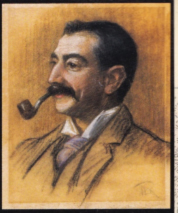Why was Fort Hall given that Name?
Many of you will remember Murang’a as Fort Hall, and you may have wondered at the name. When the railway reached the end of the Kapiti plains in 1899, it was half way to its final destination – Lake Victoria. The directors decided to build a depot on the boggy flat ground they began to call Nairobi before tackling the uphill gradient to the lip of the Rift Valley and the precipitate descent down its wall. This meant that Fort Smith, a few miles uphill from Nairobi, and for many years the government station on the route to Uganda, was no longer needed as a staging post. It was decided to abandon it and establish a centre in Nairobi instead. John Ainsworth, the government representative in Machakos, managed to bag the coveted administrative post in Nairobi and this meant that Frank Hall, who had been at Fort Smith since 1892, was relegated to Machakos, much to his disgust. He felt (and he was probably right) that he understood the Kikuyu better than any other white man. He was certainly fluent in their language and in Swahili. Finally Hall managed to get back into the Kikuyu area when the government decided to establish a post at Mbirri and asked Hall to build it.

Frank Hall
Who was Frank Hall? Educated at Sherborne and Tonbridge, he abandoned his job in the Bank of England and went to teach in South African schools. Leaving teaching, he tried storekeeping and farming in South Africa, but he finally found his feet when he joined the Imperial British East Africa Company and was sent from Mombasa inland to the Kikuyu area. Stationed at Fort Smith, he was engaged in supplying caravans to Uganda and in trying to keep the peace in the area, a sometimes difficult task because of ill feeling between the Maasai and Kikuyu peoples. He also had to fend off wild animals – hyenas were a nuisance, even entering tents and trying to feast off live sleepers. Lions and leopards were a constant threat – there were several fatalities from lion attacks.
Hall fell prey to a rhino. He told his father: “I let him come to within 10 yards and then made a rush to pass by him totally clear, trusting that he would not be able to turn sharp. But he doubled on me like a hare and so I had dodged all I knew but he was too quick and I soon found myself sailing through space…The rhino hardly let me reach the ground before he repeated the operation. The last time I came down right on my head and was so dazed I couldn’t move and the old beast stood nosing at me viciously but he couldn’t get his horn into me as I was flat on the ground. So at last he smashed his foot down on my chest twice which, as may be imagined, with about two tonnes of beef behind it, clearly stove all the breath out of me.” Hall was carried back to Fort Smith. Dr Moffat, who had just passed Fort Smith on the way to the coast, came back and tended to Hall for a week. It was a while before Hall could walk again, and he did so with a limp.
Not long afterwards Hall had another mishap. A leopard bit his knee and the poison spread throughout his body. His second-in-command Edward Russell tried to look after him, but he lay in great pain in bed for twenty days, acquiring bed sores, before Dr Ansorge arrived in a caravan on the way to Uganda. The doctor administered chloroform and operated, but Russell wrote to Hall’s father: ‘Whether the poor fellow will ultimately pull through remains to be seen.’ It was quite a while before Hall could tell his father ‘I have had a terrible time of it…The doctor said he didn’t think I would live, but I am jogging along very well for a dead man.’ Hall was carried the 300 miles to Mombasa on a litter and shipped to England, where he recovered.
Then there were the jiggers and the mosquitoes and the dysentery and the smallpox and the plague. Hall frequently had malaria, despite taking quinine daily. But it was dysentery that ultimately felled this brave pioneer. He set out from Mbirri to settle a dispute, returning five days later suffering from a bad attack of diarrhoea. When he became very ill, Dr Radford was sent for from Nairobi. But Hall became weaker and ultimately died on 18 March 1901. An official notice was proclaimed in Mombasa on 1 June 1901 : “Notice is hereby given that the Government Station at Mbirri in the Kenia District will be named officially as FORT HALL in memory of the late Mr. Hall who founded the Station and devoted his energies to developing it until his lamented death last March.”
The letters of Francis Hall are in The Bodleian Library, Oxford, but there is an excellent publication: Kikuyu District: The Edited Letters of Francis Hall 1892-1901 (ed. Paul Sullivan, Mkuki Ya Nyota Publishers, Dar es Salaam, 2006)

Recent Comments